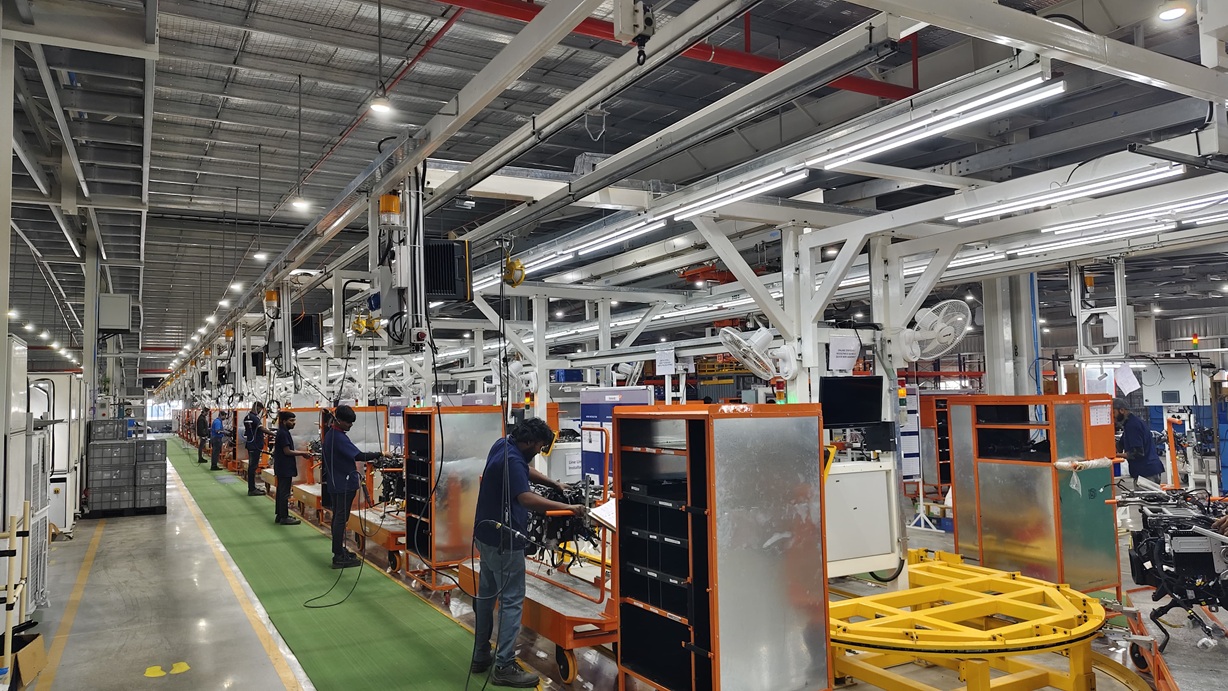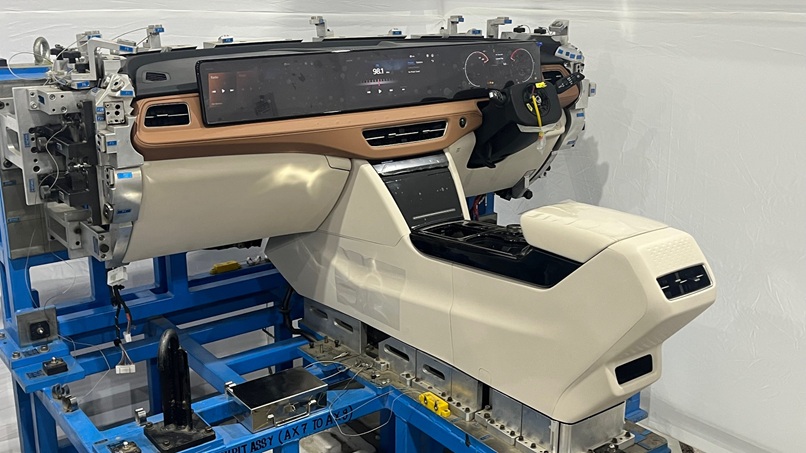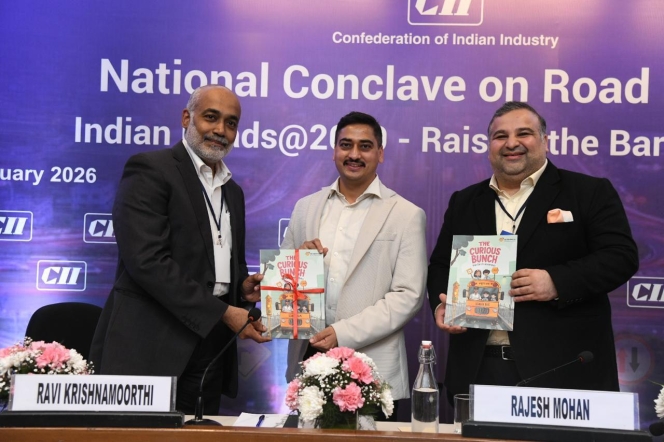
Safety and emission reduction, though not paramount, are gaining traction in the Indian commercial vehicles space. Wabco India, which has been acquired by ZF, is bullish on the market which is being driven by regulations and trends. According to P Kaniappan, Managing Director, WABCO India Ltd, the new independent Commercial Vehicle Control Systems division with ZF will offer better value and service to the Indian customers in the local context. The company keeps focusing on bringing its global capabilities to cater to new regulations and demand for advanced driver assistance, braking, stability control, suspension, transmission automation and aerodynamics to improve safety, efficiency and connectivity of commercial vehicles.
 ZF Friedrichshafen completed its USD 7 billion acquisition of commercial vehicle technology supplier Wabco Holdings amid the pandemic last year. The integration is still underway and is expected to finish in early 2022. As part of the process, the company’s initial focus was to ensure seamless business continuity with customers and to assure employees that the acquisition is another part of the business. “From day one, we had communication with all our employees, giving them the rationale and logic of this merger with the customer centricity approach for which we are known in India and globally,” said P Kaniappan, Managing Director, WABCO India Ltd.
ZF Friedrichshafen completed its USD 7 billion acquisition of commercial vehicle technology supplier Wabco Holdings amid the pandemic last year. The integration is still underway and is expected to finish in early 2022. As part of the process, the company’s initial focus was to ensure seamless business continuity with customers and to assure employees that the acquisition is another part of the business. “From day one, we had communication with all our employees, giving them the rationale and logic of this merger with the customer centricity approach for which we are known in India and globally,” said P Kaniappan, Managing Director, WABCO India Ltd.
The acquisition is expected to create a powerhouse in the commercial vehicle space, offering better value and service, catering to demand for safety, dynamics controls, air suspension systems, fuel efficiency, emission reduction, fleet management and connectivity.
Wabco, which will be the 10th division of the Germany-based technology company, will operate as the independent Commercial Vehicle Control Systems division within ZF.
“We are updating our customers on the integration process, which is taking place at a global level. The integration process is very structured and professionally aligned internally,” added Kaniappan.
Wabco is the leading global supplier of braking control systems and other advanced technologies that improve commercial vehicles’ safety, efficiency and connectivity. Wabco is present in India for more than 60 years. Powered by its vision for accident-free driving and greener transportation solutions, Wabco India provides industry-leading solutions in the autonomous, connected and electric (ACE) domains to the commercial vehicle industry in India.
Currently, Wabco India Limited is a world-class manufacturer and local market leader in advanced braking systems, conventional braking products and related air assisted technologies and systems in India. Headquartered in Chennai, Wabco India has five manufacturing facilities, an advanced technology development centre, a vehicle testing facility and a nationwide aftermarket distribution and services network. Wabco India is committed to the long-term success of its customers by leveraging Wabco’s robust global technology portfolio.
Though Kaniappan agrees that the integration would have been a smoother ride if the pandemics had not caused subsequent lockdowns, he said the employees’ safety and health have always been paramount for the company. “Yes, the focus could have been much more intense (on the integration), and the timeline could have been shorter. But by the time we started the integration, the pandemic was already affecting the world. So that’s the reason we had to stretch the integration deadline.”
Wabco is betting high on all its product range considering the new regulations related to safety, emission, fuel economy and total cost of ownership. According to Kaniappan, Wabco braking system will remain the main growth driver for the company. India has been traditionally the drum brake system market. However, with the growing emphasis on safety and new mobility, the Indian auto industry is slowly moving on to the air disc brake (ADB), which offers better safety, service, comfort and overall cost. The ADB offers a shorter stopping distance, consistent brake performance and very high mechanical efficiency. The prime advantage of ADB is in weight reduction; the single-piston allows to deliver the same performance with a significantly lower number of components, which in turn minimises parts failure. The company launched disc brake systems for the bus segment, mainly for the front axle. “Within our brake system, the company also aims to improve the efficiency of the braking system that consumes energy,” added Kaniappan.
 He also added that the increased axle load norm demands improvement in the braking system. As a result, the company has upgraded all its braking system products to support the customers, which involves upsizing the compressors or optimising the size of the compressors, upgrading the air management system products, and in some cases, changing the actuators and other elements of the braking system to handle the higher axle load requirement.
He also added that the increased axle load norm demands improvement in the braking system. As a result, the company has upgraded all its braking system products to support the customers, which involves upsizing the compressors or optimising the size of the compressors, upgrading the air management system products, and in some cases, changing the actuators and other elements of the braking system to handle the higher axle load requirement.
Commercial vehicles, trucks, buses and multi-axle vehicles account for a third of road accidents in India. About 84 percent of accidents occur owing to loss of control.
India is also in the process of making electronic stability control (ESC) mandatory soon. The draft notification has been issued for the ESC for buses, which is expected to come into force by April 2023. It aims to achieve higher standards of safety for all categories of vehicles. Wabco India has already been supplying Electronic Stability Control (ESCsmart) for trucks and buses. The ESCsmart improves vehicle stability during highly dynamic driving manoeuvres. ESCsmart provides yaw control on low friction road conditions and roll stability control on high-friction road conditions. It operates independently of driving and load conditions and delivers outstanding control quality due to self-adapting capabilities on the road.
In addition, Indian customers are now testing and evaluating some advanced emergency braking systems for collision avoidance, which immediately assists and alerts the driver. The Wabco executive expects autonomous emergency braking (AEB), which has collision warning systems and collision mitigation systems, will soon be introduced in India. “The technologies available with both companies are to be localised at an appropriate time,” he added.
Wabco India also offers solutions to make air suspension intelligent. The company’s air suspension with electronic control air suspension technology (ECAS) is an alternative to the steel-spring suspension. It improves fuel economy, increases ride comfort, enhances passenger safety and improves vehicular stability. With this technology, the vehicle can sense the road and distribute the load, and the whole system can be raised or lowered to give reduced drag and roll-over protection. Usually, on bumpy roads, air depletes in the suspension; however, ECAS can ignore small humps on the road and air depletion will occur only during the heavy bumps. “With the ECAS, we can reduce air consumption, resulting in saving fuel. As every vehicle goes through a bumpy road, the air depletes. Our electronic control can programme the system so that it does not deplete, and it improves the fine balance of the compressor running. Plus, it can also raise and lower the height of the vehicle’s suspension. This fuel-saving technology will find its place due to CAFÉ norms. This technology is also progressively coming into the Indian market, and we are working with some customers,” added Kaniappan.
 Tyres are the only component that touch the road, which influences the safety and fuel efficiency of the vehicle as well. Inappropriately aired tyres impact the fuel economy and tyres’ life and could also cause accidents. As per a report, over 30 percent of truck breakdowns were caused by tyre failure. Wabco India’s OptiTire, tyre pressure monitoring system (TPMS), helps maintain tyre pressure at the recommended level and detects slow punctures early. This also helps in improving fuel efficiency, rolling resistance and reduction in CO2 emission. The company is also working on getting TMPS sensors localised to make the technology competitive in the country.
Tyres are the only component that touch the road, which influences the safety and fuel efficiency of the vehicle as well. Inappropriately aired tyres impact the fuel economy and tyres’ life and could also cause accidents. As per a report, over 30 percent of truck breakdowns were caused by tyre failure. Wabco India’s OptiTire, tyre pressure monitoring system (TPMS), helps maintain tyre pressure at the recommended level and detects slow punctures early. This also helps in improving fuel efficiency, rolling resistance and reduction in CO2 emission. The company is also working on getting TMPS sensors localised to make the technology competitive in the country.
The AIS 140, standards published by the Automotive Research Association of India (ARAI), mandates a vehicle-tracking device and an emergency button in all existing and new public-service and commercial vehicles. Wabco India also finds business opportunities in the vehicle tracking space.
Fleet management is also another area where Wabco sees more considerable opportunities as the fleets are now realising the importance of the total cost of ownership through such programmes. In addition, Wabco offers its connected vehicle programme for OEMs.
Wabco India also launched fleet management solutions or connected vehicle programme. The company has already strengthened its connected vehicle solutions after the acquisition of Transics. The company has developed a solution in India for the Indian market in the local context. It has partnered with a few customers and is powering its connected vehicle solutions by providing end-to-end solutions from hardware, firmware and software. This includes advanced fuel management, uptime monitoring, trip monitoring and route management, vehicle diagnostics, track and trace of fleets, helping improve fleet logistical efficiency and the safety and comfort of passengers and drivers.
 For the aftermarket, WABCO acquired AssetTrackr. Asset Trackr offers global capabilities with a value proposition for the Indian market. The company is now leveraging its aftermarket and using the aftermarket network, service centres to promote Asset Trackr as another significant new revenue stream.
For the aftermarket, WABCO acquired AssetTrackr. Asset Trackr offers global capabilities with a value proposition for the Indian market. The company is now leveraging its aftermarket and using the aftermarket network, service centres to promote Asset Trackr as another significant new revenue stream.
Demand for OE commercial vehicles has been slackening for two years. In FY20, commercial vehicle sales plunged 29 percent , followed by over 20 percent in FY21. As a result, the company is banking on its reach and product offering in the aftermarket business. Wabco India’s aftermarket business grew over 50 percent in the first three months of this calendar year.
Taking a lesson from the pandemic that has severely impacted commodity prices, Wabco explores the chances to procure steel, aluminium from the prime producers in the local market to have stability in supply. “We have learned a lot during recent times. We can anticipate the things in a much better way and can have better preparedness, flexibility and agility which will help us to face any potential headwinds that are going to come,” added Kaniappan. (MT)
- IAC India
- Lumax Group
- IAC Group
- Mahindra
- VECV
- Maruti Suzuki India
- Skoda
- Volkswagen
- Stellantis
- Sunil Koparkar
IAC India Bets On Engineering Depth & Diversification, Targets 20% CAGR Growth Till FY2030
- By Nilesh Wadhwa
- February 28, 2026

Sunil Koparkar, Managing Director, IAC India, outlines the company’s strategy to reduce customer concentration, expand exports and leverage group synergies following its integration with the Lumax Group.
As India’s automotive interior market evolves towards premiumisation, localisation and faster product cycles, IAC India, part of the Lumax Group, is repositioning itself beyond a single-customer dependency model – without diluting its core partnerships.
IAC India continues to derive a significant share of its revenue from Mahindra’s passenger vehicle business. While the concentration remains high, Koparkar is clear that diversification will be driven through growth rather than dilution.
“Mahindra will always be our primary customer. We have a very strong strategic partnership. But we are also working on expanding with other OEMs and in the commercial vehicle space. Our goal remains a 20 percent CAGR,” he says.
For FY2025, IAC India USD 140 million in revenue, and is targeting a 20 percent growth in FY2026. The company counts Mahindra as its primary customer with almost 78 percent of its business coming from them, while Maruti Suzuki India (12%), Volvo Eicher Commercial Vehicles (5%), Skoda-Volkswagen (3%) and Stellantis (1%) contribute towards the remaining business.
 What’s more, responding to the company’s expansion plans, Koparkar revealed, that IAC Group, in addition to introducing new products, is also in talks with new-age players who have just entered Indian market (and also planning too) for supplying products.
What’s more, responding to the company’s expansion plans, Koparkar revealed, that IAC Group, in addition to introducing new products, is also in talks with new-age players who have just entered Indian market (and also planning too) for supplying products.
Currently, passenger vehicles account for roughly 90 percent of the business, with commercial vehicles forming the balance. Value-wise, Koparkar expects CV contribution to rise, even if percentage splits remain broadly similar due to the rapid growth of PV volumes.
Responding to a query on the potential growth from the CV segment, Koparkar said, “There is clear potential in CV interiors. As the CV market moves towards more comfortable cabins — with features like airbags, HVAC and infotainment — the opportunity for interior suppliers increases. Through Volvo Eicher, we have already helped drive that trend in India.”
When asked about the company’s expansion plans, Koparkar also stated that IAC Group is open to expanding to new regions as it aims to operate closer to its customers. One of the potential new projects for the company could very well be Chennai, as the company is in early talks with a new CV customer as well as VinFast.
Engineering as a Standalone Growth Lever
A key pillar of IAC India’s strategy is its expanding engineering capability. The company has been scaling up its R&D and product development team and increasingly positioning engineering services as a distinct revenue stream.
The company at present, employs over 300 engineers in India, which it aims to scale it upto 400-plus by next year and 500-plus in the coming few years.

Historically, the Indian Engineering Centre supported the global IAC Group. “We were primarily the IAC Group engineering development centre. We will continue to provide those services. But now, besides global support, we are also offering engineering services to local OEMs,” Koparkar explains.
These services span studio collaboration, basic product design, CAE analysis and prototype development. In some cases, this can potentially evolve into full-scale supply programmes.
Importantly, innovation is now being formalised locally. “This year alone, we are in the process of filing about 30 patents,” he says. Earlier, intellectual property was subsumed under the global entity; now, filings are being initiated in India.
R&D investment remains aligned with group benchmarks at around 1.5–2 percent of revenue.
Exports: Measured Ambition
In terms of export potential, it currently contributes less than 5 percent towards the revenue, primarily through smaller kinematic parts. Direct exposure to the US market is negligible.
“Tariff-related uncertainty does not affect us because we do not export to the US,” Koparkar says. “Logistically, it does not make sense to ship our large interior parts there.”
Europe remains the primary export target. “The opportunity lies in leveraging our design capabilities and local development strengths. If logistics can be managed efficiently, there is room to grow.”
He also sees the Lumax Group’s aftermarket division as a future vehicle for export expansion.
Localisation and Supply Chain Resilience
On the localisation front, IAC India has made significant progress. “Last year was the first time we were able to localise over 99 percent of our tooling and development in India,” Koparkar states. Machinery on shop floors is largely localised, with only certain raw materials still imported.
The semiconductor crisis, he adds, had minimal direct impact. “We do not source electronics for our products — that is handled by the customer. However, from a development perspective, we are evaluating secondary substitutes for imported components, so we are prepared in case of disruptions.”
Premiumisation, Sustainability and AI
Premiumisation is currently the dominant interior trend. “Customers are moving away from basic plastics to more premium-feel interiors. Electronification is a big driver,” Koparkar says.
Sustainability, however, remains nascent in India. “There is no specific push for sustainable materials yet. What OEMs are looking for is lightweighting to meet upcoming CAFE norms. If a sustainable material delivers significant weight reduction, then it becomes serious.”

He points to jute, coir and bamboo fibres as potential alternatives but stresses that ecosystem-level collaboration is essential. “Unless a circular economy develops around us, sustainable materials will struggle to scale.”
On automation, operations across IAC’s six plants are roughly a 50:50 mix of automated and manual processes, depending on volume justification. Cobots and semi-automation are used where full automation does not offer viable returns.
AI, meanwhile, is expected to influence design more than manufacturing. “We see AI helping us accumulate design learnings and reduce design cycle times. Its impact will be more visible in engineering services than on the shop floor.”
Faster Development Cycles
Product life cycles are shrinking rapidly. “It used to take five years to develop a car,” Koparkar reflects. “With the XUV700, we worked with the customer to shrink that to 42 months. EVs are being developed even faster.”
As development timelines compress and interiors become more technology-intensive, IAC India is betting on engineering depth, localisation strength and group synergies to sustain its 20 percent growth ambition – while steadily broadening its customer and geographic footprint
- Rosmerta Technologies
- The Curious Bunch
- CII National Conclave on Road Safety
- Dr Rajesh Mohan
- Ravi Krishnamoorthi
- road safety
Rosmerta Launches Road Safety Comic Book For Schools
- By MT Bureau
- February 27, 2026

Rosmerta Technologies has launched a comic book titled ‘The Curious Bunch’ at the 3rd Edition of the CII National Conclave on Road Safety. The publication is designed to introduce road safety awareness to children.
The initiative aligns with the Government of India’s ‘4E’ strategy for road safety, which focuses on Engineering, Education, Enforcement and Emergency Care. The comic book aims to address the 168,000 road fatalities reported in India in 2022 by fostering safe habits at a school level.
The comic book uses illustrations to present road scenarios, including pedestrian conduct, school bus safety, traffic signals & the use of helmets, seatbelts and child restraint systems. By educating children, the company intends to influence the behaviour of parents and the wider community.
Rosmerta, a provider of mobility solutions, currently operates technology systems for automated driving tests and AI-based monitoring. The launch of ‘The Curious Bunch’ marks an expansion of its activities into the education pillar of the national safety framework.
Dr Rajesh Mohan, DCP, Gurugram Traffic, said, “When we educate children and instil strong moral and ethical values, the impact travels far beyond the classroom. Children naturally share what they learn. They question, they explain, and they influence conversations at home. In many ways, they become powerful advocates, encouraging their parents to be more aware, more responsible, and more engaged. Over time, this awareness translates into action, because parents are also drivers, commuters, and decision-makers on the road.”
Ravi Krishnamoorthi, Group President, Rosmerta Technologies, said, “Every road accident statistic hides a parent’s anxiety. In 2022 alone, India reported over 168,000 road accident fatalities, according to government data. Road safety is not merely about compliance; it is about compassion and collective responsibility. When a child understands why a red light matters or why a helmet can save a life, they don’t just learn a rule - they become ambassadors of safety within their families and communities. Through ‘The Curious Bunch’, we aim to nurture this awareness early, because the habits we shape in children today will define the safety culture of our nation tomorrow.”
- Maruti Suzuki India
- Transport Department of Tamil Nadu
- Automated Driving Test Tracks
- ADTT
- M K Stalin
- RTO
- CMVR
- Rahul Bharti
Maruti Suzuki Commissions Seven Automated Driving Test Tracks In Tamil Nadu
- By MT Bureau
- February 27, 2026
Maruti Suzuki India, in partnership with the Transport Department of Tamil Nadu, has announced the commissioning of seven Automated Driving Test Tracks (ADTTs) in the state. The facilities were inaugurated by the Chief Minister of Tamil Nadu, M K Stalin.
The tracks are located at Regional Transport Offices (RTOs) in Coimbatore (Central), Tiruvannamalai, Krishnagiri, Madurai (North), Sivagangai, Dindigul, and Tiruchirappalli (West). These sites form part of a Memorandum of Agreement to automate ten tracks across the state, with the remaining three at Tirunelveli, Tuticorin and Marthandam scheduled for operation shortly.
The ADTTs are designed to evaluate applicants for two-wheeler and Light Motor Vehicle (LMV) licences. The system removes human intervention from the evaluation process to ensure objective testing according to the Central Motor Vehicle Rules (CMVR).
Key technical components include:
- Video Analytics: High-definition cameras to monitor vehicle movement and path adherence.
- Sensors: Radio Frequency Identification (RFID) and Harnessing AutoMobiles for Safety (HAMS) technology.
- Identification: Face-recognition systems to verify candidate identity.
- Results: Integrated IT systems that generate test results automatically based on real-time data.
The carmaker has commissioned 56 ADTTs across eight states, including Uttar Pradesh, Delhi, and Bihar. Following the completion of agreements with Rajasthan and Andhra Pradesh, the company’s footprint is expected to reach 81 tracks nationwide.
Rahul Bharti, Senior Executive Officer, Corporate Affairs, Maruti Suzuki India, said, “As part of Maruti Suzuki’s road safety initiatives implemented across multiple states, we are partnering with the Government of Tamil Nadu to strengthen the driver licensing evaluation process through the deployment of 10 Automated Driving Test Tracks (ADTTs). Equipped with high-definition cameras and advanced analytics, these ADTTs enable a comprehensive, efficient, and transparent assessment process. It eliminates any human bias and ensures that only skilled drivers are awarded a license.”
“According to data shared by the Ministry of Road Transport & Highways, India witnessed 1.77 lakh road accident deaths in 2024. Promoting disciplined driving practices and ensuring rigorous driver evaluation are vital to prevent road accidents and augment road safety across the country,” he said.
BYD To sponsor BVRLA Annual Dinner 2026
- By MT Bureau
- February 26, 2026

BYD, the world’s leading manufacturer of New Energy Vehicles, will once again serve as the headline sponsor for the British Vehicle Rental and Leasing Association (BVRLA) Annual Dinner in 2026. This marks the third consecutive year the company has supported the prestigious event, which is set to take place on 4 March 2026 at the JW Marriott Grosvenor House Hotel on Park Lane, London. The dinner is widely recognised as the premier gathering for professionals across the rental, fleet management and leasing sectors.
Through its ongoing sponsorship since 2024, BYD reaffirms its commitment to this vital segment of the UK automotive market. The company’s expanding presence was underscored in 2025 by the introduction of several new models, including the SEALION 7, DOLPHIN SURF, SEAL 6 Saloon and Touring and the ATTO 2. These launches contributed to significant sales figures, with 21,824 units delivered to fleet customers and 5,964 to the rental sector. The momentum has continued into 2026 with the debut of the SEALION 5 DM-i, while the ATTO 2 DM-i and ATTO 3 EVO are expected to arrive shortly. Supporting this growth is a dedicated UK fleet team of 11 specialists, offering tailored product and service expertise.
The BVRLA represents around 1,000 member organisations, ranging from SMEs to large public companies, all operating within or alongside the UK’s vehicle rental and leasing industries. By engaging with government and upholding professional standards, the association enables its members to provide safe, sustainable and accessible transport solutions. This year’s Annual Dinner will feature the presentation of the Industry Hero Awards and live entertainment from award-winning comedian Tom Ward, celebrating excellence across the sector.






Comments (0)
ADD COMMENT